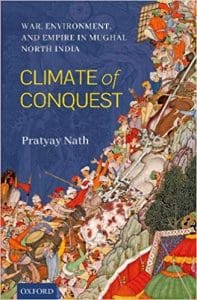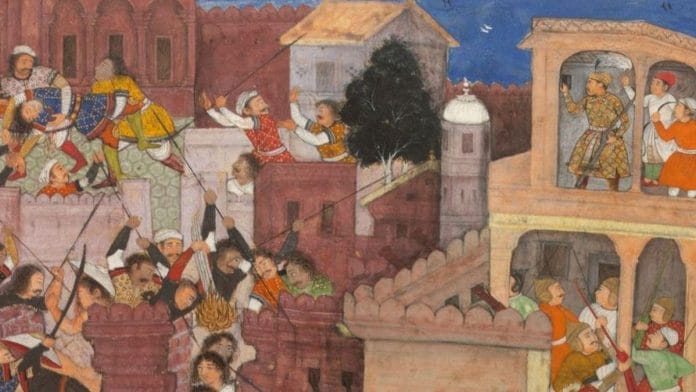One of the first kingdoms to fall to Akbar’s armies was Malwa. Justifying this invasion, Nizamuddin Ahmad puts the blame squarely on Baz Bahadur, the sultan of Malwa. The Mughal commander points out that instead of governing his kingdom, Baz Bahadur indulged in ‘unlawful and vicious practices [ham-wāra ba-lawāzim malāhī ishtighāl mī-numāyīnad]’.
Another chronicler, Muhammad Arif Qandahari goes a step further and says that Baz Bahadur was ‘carrying on administration just as a donkey, employed to dig and carry mud’. Nizamuddin argues that this neglect of state affairs allowed ‘tyrants and oppressors’ to exploit the poor and meek, and resulted in the destruction of the populace and the desolation of the land. According to Nizamuddin, this upset Akbar greatly. He declared that the ‘honour of empire demanded [ghairat-i salt̤anat muqtaẓá], that the country of Malwa should come into the possession of the servants of the powerful [Mughal] state, and become the resting place of peace and safety’. The point to note here is that Nizamuddin did not see the alleged self-indulgence of a ruler or his inability to deliver good governance as a problem of one individual only. Instead, what he highlights in his narrative is how this affected the wider order of things and the fate of his subjects.
The justification of the expedition sent against Daud Khan Karrani, the Afghan chieftain of Bihar and Bengal, can be cited as another example. Justifying the invasion, Abul Fazl argues that Daud’s father Sulaiman Karrani ‘always remembered his position, and paid the respect of obedience’ to Akbar. Consequently, the Mughal emperor.
Also read: The Indian political leaders of today who come closest to Akbar, Ghiyasuddin, Aurangzeb
had never felt the need to treat him harshly. However, Daud had strayed from these duties. Abul Fazl says that Akbar could not but intervene when Daud ‘stretched his foot beyond his condition and became an element of disturbance in the country’. Nizamuddin Ahmad mentions that Daud assumed the title of badshah and provoked the Mughals by destroying a fort that a Mughal commander had recently built.
The chroniclers then unanimously argue that all this made the Mughal emperor feel that the chastisement of that group (ta’dīb-i ān guroh) and the preservation of the condition of the subjects of that region (murā’āt-i aḥwāl-i ra‘āyā-i ān diyār ) was his moral obligation as a just ruler.
Through such a narrative, the imperial chroniclers first project an image of the ‘proper’ order of things. In such an order, rulers such as Sulaiman Karrani would remember their ‘proper’ place in the political universe over which the Mughal emperor presided. They would express at least outward submission by regularly paying tributes and publicly acknowledge Mughal suzerainty. After this, Daud Khan is projected as the villain who upset this ‘proper’ order of things by neglecting his duties as a Mughal subordinate and by transgressing his limits. Once again, such an explanation is supplemented by a narration of how Daud’s actions were not only an instance of individual insolence, but how it adversely affected the people over whom he ruled. Under these circumstances, the duty of the Mughal emperor was twofold.
First, as the upholder and protector of order in a political society in which everybody was to stay in one’s assigned position, Akbar needed to teach Daud a lesson in discipline and performance of one’s duties. Second, as the benevolent nurturer of the common people, he required to improve the condition of the ‘subjects’ who lived in the territories over which Daud ruled. The invasion of Daud’s territories thus became the logical conclusion of Akbar’s obligation to fulfill both these duties.
Abul Fazl uses the same logic to justify the imperial invasion of Kashmir in 1585–6. He highlights how the ruler of Kashmir had betrayed Mughal benevolence towards him, chosen ‘the path of presumption’, neglected the duties of kingship, and given into self-indulgence.
Also read: How the golden era of Kathak began during the Mughal rule under Akbar
In the face of a Mughal invasion, Yaqub Chak, the son of the ruler of Kashmir, emerged as the leader of the resistance for a section of the Kashmiri aristocracy. Abul Fazl’s narrative hence next focuses on how Yaqub’s rule was the embodiment of evil itself, thereby strengthening justification for the Mughal invasion of the Srinagar Valley. The list of allegations against him is a long one. Abul Fazl begins by saying that Yaqub ‘increased in presumption and became refractory [bad-gohar na kh wat afzūda sar-tābī pesh girift] and fell into improper desires [nā-sazā kh wāhish-hā]’. Abolishing the treaty with the Mughals, he is said to have conferred upon himself the title of Shah Ismail. Abul Fazl also alleges that Yaqub, much like Baz Bahadur, ‘did not do the work of the world [ kār-i dunyā na-sā kh ta]’. Instead, he is said to have derived pleasure from participating in religious disputes, oppressing his subjects, and victimizing Sunni Muslims.
The narrative hence creates a villain, one who has disturbed the social fabric by not fulfilling his kingly obligations. Once this was done, the stage was then set for the narrative to eulogize the invasion which was destined to restore order and harmony as well as bring the inhabitants of Kashmir under the watchful eyes of the just Mughal emperor. Similar literary strategies are used repeatedly by the chroniclers to legitimize most of the invasions undertaken under Akbar.
 This excerpt from Climate of Conquest: War, Environment and Empire in Mughal North India by Pratyay Nath has been published with permission from Oxford University Press India.
This excerpt from Climate of Conquest: War, Environment and Empire in Mughal North India by Pratyay Nath has been published with permission from Oxford University Press India.







The same policy of freeing the oppressed by invading states is followed by the USA. In present days.
Don’t know how an invader would say he is freeing natives. These terrorists should never be glorified.